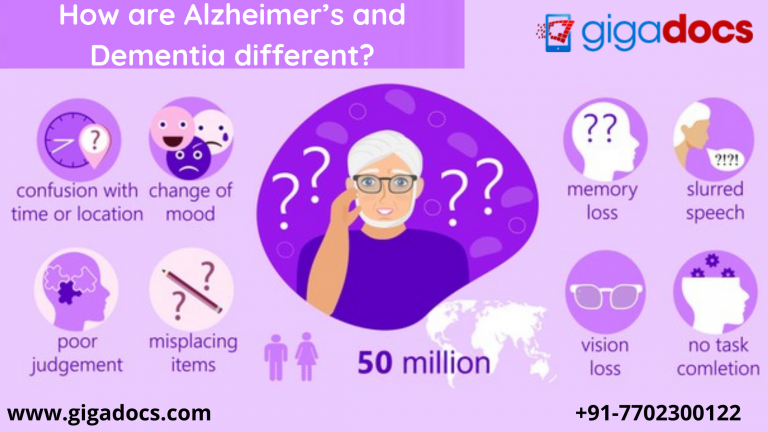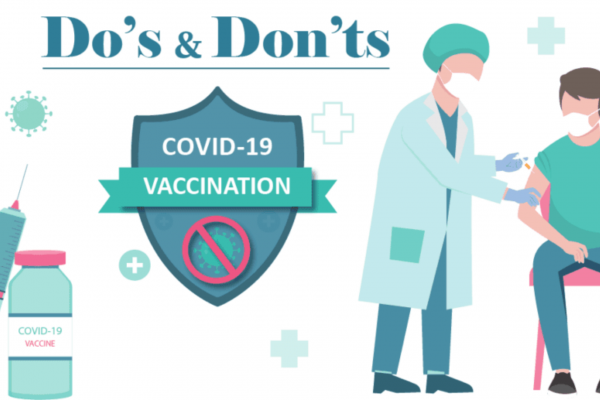According to HelpAge International, about 139 million people in India are over 60 as of 2019. They account for more than 10% of the overall population. As we progress over the years, the share of older persons is predicted to nearly quadruple to 19.5% in 2050. This figure will include 319 million individuals over 60, and one out of every five Indians will be a senior. As India’s population ages, so does the number of people with Alzheimer’s and other forms of dementia. This sobering number serves as a reminder that the most predominant risk factor for Alzheimer’s and dementia is age.
As we commemorate Alzheimer’s Awareness Month in January, we’d like to emphasize that it’s never too late to start healthy practices. Adopting a healthier lifestyle will help you have a healthy self that will help you fight against any disease onset.
Often people get confused between Alzheimer’s and Dementia, so much so that they use both interchangeably. However, they both are different, we have compiled the points of difference between Alzheimer’s and Dementia below-
Difference between Alzheimer and Dementia
| Points of Difference | Alzheimer’s | Dementia |
| Term explanation | Alzheimer’s disease is a degenerative brain illness that gradually degrades memory and cognitive function. | Dementia is a word used to describe a set of symptoms that interfere with daily activities affecting one’s capacity to remember, reason, or make decisions. |
| Cause | The exact cause behind Alzheimer’s is unknown | The cause behind Dementia is brain cell destruction. This injury impairs brain cells’ ability to communicate with one another. Thinking, behavior, and feelings can change when brain cells cannot normally communicate with each other. |
| Symptoms | Difficulty recalling recent occurrences or talksDepressionImpaired decision-makingDisorientationConfusionBehavioral shifts in severe stages of the disease, difficulty speaking, swallowing or walking | Initial signs of Lewy body dementia (LBD) include visual hallucinations, difficulty with balance, and sleep abnormalities. People are more prone to suffer involuntary movement in the early stages of dementia caused by Parkinson’s or Huntington’s disease. |
| Diagnosis and Cure | Each of the three stages lasts a different length of time. Alzheimer’s is a lethal disease that currently has no cure. Each of its three stages lasts a different length of time. A person with Alzheimer’s has a four to eight-year lifespan on average after diagnosis. However, some people have battled this disease successfully for up to 20 years. | Several kinds of dementia are reversible, but most are permanent and will cause further deterioration over time. Vascular dementia, for example, can be slowed in some situations, but it still shortens a person’s life. |
Alzheimer’s and Dementia Prevention
- Engage in Some Physical Activity: Every day, thirty minutes of walking or gentle exercise is recommended to enhance appetite and strength. You must be physically active enough to boost your heart rate and become slightly out of breath. Try doing some light cleaning, going for a walk around the house, climbing the stairs, or dancing. Regular physical activity lessens the risk of acquiring Alzheimer’s disease in the middle-aged and the elderly. Furthermore, physical activity does wonders for your heart and brain health.
- Maintain a Healthy Diet- Food has a significant impact on your mental health and well-being. The food you eat has an effect on energy level, as well as how well you sleep and think. Consume a well-balanced diet rich in oily fish, fruits and vegetables, unrefined cereals, and low in red meat and sweets. Reduce your consumption of saturated fat-containing foods such as cakes, cookies, and most cheeses, and restrict your intake of sugary desserts. Reduce your salt intake because salt elevates blood pressure and increases your risk of stroke. Read food labels to find out what’s in them and look for healthier alternatives.
- Take Care of your Heart- Consult your doctor about your current medications and the risks of high blood pressure. As a New Year Resolution, avoid smoking and excessive alcohol consumption. If you already smoke, make a sincere effort to quit. You are more likely to acquire dementia and injure your lungs and heart if you smoke. Limit your alcohol consumption to acceptable levels.
- Participate in Social Activities- Maintain social connections and communicate with others regularly. Keeping socially engaged and having a strong social network lowers your chances of dementia. Visit others or have them visit you; however, as the cases of Omicron rise, we advise you to follow caution while you go outdoors don’t forget to put on the mask and practice social distancing.
- Exercise your Brain- Who says we grow out of games and puzzles as we get older? Challenge your brain by reading, solving puzzles, word searches, or crosswords, trying something new, playing games, or learning a new language for a healthy mind and brain. Remember that if you can keep your mind active, you will be less likely to develop early dementia.
Living with Alzheimer’s and Dementia
When a family member has Alzheimer’s or dementia, they encounter numerous obstacles. As Alzheimer’s and other dementias progress, habits change, and so does the responsibility of a caretaker.
- Early-Stage Alzheimer’s Care Giving
“Early stage” refers to people of any age who have been diagnosed with Alzheimer’s disease or a comparable ailment and are in the early stages of the disease. Alzheimer’s disease in its early stages might linger for years.
Most persons with Alzheimer’s operate independently in the early stages. He or she can continue to drive, participate in social events, volunteer, and even work. Your involvement as a caregiver is critical: you must provide support while also helping them to look ahead to the future.
- Middle-Stage Alzheimer’s Care Giving
Damage to the brain during the middle stages of Alzheimer’s might make it harder to articulate thoughts and conduct ordinary duties. You may notice the Alzheimer’s patient mumbling words, having difficulty dressing, becoming agitated or furious, or behaving in unusual ways, such as declining to bathe.
The intermediate stages of Alzheimer’s disease are usually the most severe and can endure for many years. Caring for someone in the middle stages of Alzheimer’s condition calls for adaptability and patience.
- Late-Stage Alzheimer’s Care Giving
Alzheimer’s late-stage can last anywhere from a few weeks to several years. As the disease develops, an individual with late-stage Alzheimer’s may have trouble eating and swallowing, require assistance walking and finally become unable to walk, and is susceptible to infections, particularly pneumonia.
At this stage, sensory touch, sound, sight, taste, and smell are all ways to show them how much you care. For example, try playing their favorite music or watching a favorite movie, cooking a delicious meal, or brushing the person’s hair. During the final phases, your responsibility as a caregiver is to maintain the patient’s quality of life and dignity.
Alzheimer’s and Dementia care with Gigadocs
Both Alzheimer’s and Dementia need special care and medical attention. Gigadocs telehealth app plays an increasingly beneficial role in the medical assessment and ongoing management of Alzheimer’s disease.
Through Gigadocs, Alzheimer’s, and Dementia patient’s caregivers can work together with Neurologist, on the disease progression, its subsequent primary care, and cognitive rehabilitation from the comfort and safety of the person’s home. As the cases of omicron rise, home-based digital consultation offers a safeguard against transmission.
To book your consultation, download the Gigadocs app from-
IOS App – apple.co/2W2iG4V
Android App – bit.ly/33AQoRC




